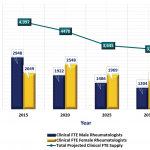Like many states in recent years, Georgia has struggled to provide patients with adequate access to rheumatologists and other cognitive specialists, with Georgia averaging 74,713 people per rheumatologist. Of equal concern, 31% of Georgia’s rheumatologists are approaching retirement age. During the current legislative session, the ACR has stepped up with a proposal to alleviate some access issues, and the model bill has been introduced in the Georgia state legislature.
H.B. 442 at a Glance
H.B. 442 would establish a loan forgiveness program for cognitive specialists who do not qualify for the federal Health Resources and Services Administration (HRSA) program. It would provide tax-free loan forgiveness in the amount of $25,000 per year to cognitive specialists who commit to practice in an underserved area of the state, with a maximum lifetime amount of $100,000. This bill would not only address the rheumatology shortage in Georgia, but would help address growing access and network adequacy issues plaguing rural and underserved areas of the state. If enacted, it would be the first state program of its kind in the nation.
The bill has been sponsored by Rep. Kim Schofield (D-60) and has a growing list of co-sponsors. To say that Rep. Schofield is familiar with rheumatology workforce needs is an understatement: She is a lupus researcher and patient who is intimately familiar with the difficulties associated with treating and living with rheumatic disease.
Currently, the bill is with the House Appropriations Committee, but because it was introduced shortly before Cross Over Day, the bill won’t likely pass this year unless it gets attached to other legislation. Instead, the bill will carry over to next year when Georgia enters the second half of its two-year session. This will provide ample time to work to gain support while the legislature is out of session.
Important Note
H.B. 442 is not a panacea for the workforce challenges facing rheumatology. The ACR is constantly engaged in efforts to find ways to create and fund more fellowship spots and open up existing federal and state workforce programs to cognitive specialties. This legislation is just one aspect of a proactive approach to developing workforce solutions that enable rheumatology providers to meet the demands of an aging population.
If you are interested in the Georgia legislation, or the ACR’s model legislation, contact Joseph Cantrell, the ACR’s senior manager of state affairs. The ACR is happy to provide assistance in promoting this legislation in other states.



